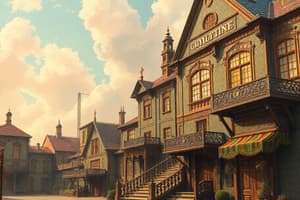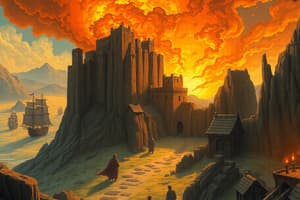Podcast
Questions and Answers
Which of the following scenarios best illustrates the use of a secondary source in historical research?
Which of the following scenarios best illustrates the use of a secondary source in historical research?
- A scholar writing a book about the impact of the Roman Empire, citing original Roman legal texts.
- A student watching a documentary film that synthesizes various historians' interpretations of World War II battles. (correct)
- An archaeologist conducting carbon dating on a fossilized bone to determine its age.
- A historian analyzing pottery shards excavated from an ancient settlement to understand trade routes.
How does the concept of 'change and continuity' help historians understand the Middle Ages?
How does the concept of 'change and continuity' help historians understand the Middle Ages?
- By isolating individual events without considering their broader historical context.
- By focusing solely on the major political upheavals and ignoring social structures.
- By examining how aspects like feudalism evolved while other aspects like religious influence persisted. (correct)
- By analyzing only the elements that remained constant, such as religious beliefs.
Which of the scenarios exemplifies how differing perspectives can influence historical interpretation?
Which of the scenarios exemplifies how differing perspectives can influence historical interpretation?
- An economist and a social historian analyzing the Industrial Revolution; the economist focuses on productivity gains, while the social historian examines the impact on labor conditions. (correct)
- Archaeologists agreeing on the age of a set of artifacts based on radiocarbon dating results.
- Two historians using the same set of census data to determine population growth rates.
- Political scientists studying voting patterns to predict the outcome of an upcoming election.
In what way did the development of agriculture during the Neolithic Era affect social structures?
In what way did the development of agriculture during the Neolithic Era affect social structures?
How did the advancements of the Scientific Revolution influence the Age of Exploration?
How did the advancements of the Scientific Revolution influence the Age of Exploration?
What is the most accurate description of the relationship between causation and consequence in historical analysis?
What is the most accurate description of the relationship between causation and consequence in historical analysis?
Which of the following represents a key difference between the Early and Late Middle Ages?
Which of the following represents a key difference between the Early and Late Middle Ages?
How did the Renaissance challenge medieval modes of thought and expression?
How did the Renaissance challenge medieval modes of thought and expression?
Which area of historical study primarily analyzes the impact of treaties and alliances on international relations?
Which area of historical study primarily analyzes the impact of treaties and alliances on international relations?
Which civilization is known for its advancements in mathematics and astronomy in Mesoamerica?
Which civilization is known for its advancements in mathematics and astronomy in Mesoamerica?
Which historical figure is most associated with leading the Protestant Reformation?
Which historical figure is most associated with leading the Protestant Reformation?
Which historical approach is most concerned with understanding the lives and experiences of ordinary people throughout history?
Which historical approach is most concerned with understanding the lives and experiences of ordinary people throughout history?
Which defining characteristic is most associated with the Enlightenment era?
Which defining characteristic is most associated with the Enlightenment era?
Which skill involves assessing the authenticity, bias, and reliability of historical sources?
Which skill involves assessing the authenticity, bias, and reliability of historical sources?
Which historical event marks a significant transition from hunting and gathering to agricultural practices?
Which historical event marks a significant transition from hunting and gathering to agricultural practices?
Which civilization is recognized for its lasting contributions in law, engineering, and governance across a widespread empire?
Which civilization is recognized for its lasting contributions in law, engineering, and governance across a widespread empire?
Which historical period saw a revival of art, literature, and learning in Europe following the Middle Ages?
Which historical period saw a revival of art, literature, and learning in Europe following the Middle Ages?
Which of these leaders played a key role in the Indian independence movement?
Which of these leaders played a key role in the Indian independence movement?
What was a primary consequence of the Industrial Revolution?
What was a primary consequence of the Industrial Revolution?
What best describes the focus of Marxist history?
What best describes the focus of Marxist history?
Which empire preserved Greek and Roman culture after the fall of the Western Roman Empire?
Which empire preserved Greek and Roman culture after the fall of the Western Roman Empire?
Which conflict is considered a direct result of ideological tensions between the United States and the Soviet Union?
Which conflict is considered a direct result of ideological tensions between the United States and the Soviet Union?
What does the study of economic history primarily focus on?
What does the study of economic history primarily focus on?
Flashcards
What is History?
What is History?
The study of past events, including their discovery, collection, organization, and presentation.
Primary Sources
Primary Sources
Firsthand accounts or direct evidence from a historical time period.
Secondary Sources
Secondary Sources
Interprets and analyzes primary sources.
Historical Causation
Historical Causation
Signup and view all the flashcards
Historical Consequence
Historical Consequence
Signup and view all the flashcards
Change and Continuity
Change and Continuity
Signup and view all the flashcards
Prehistory
Prehistory
Signup and view all the flashcards
Neolithic Era
Neolithic Era
Signup and view all the flashcards
The Enlightenment
The Enlightenment
Signup and view all the flashcards
Political History
Political History
Signup and view all the flashcards
Economic History
Economic History
Signup and view all the flashcards
Mesopotamia
Mesopotamia
Signup and view all the flashcards
Ancient Egypt
Ancient Egypt
Signup and view all the flashcards
Neolithic Revolution
Neolithic Revolution
Signup and view all the flashcards
Renaissance
Renaissance
Signup and view all the flashcards
The Reformation
The Reformation
Signup and view all the flashcards
Age of Exploration
Age of Exploration
Signup and view all the flashcards
French Revolution
French Revolution
Signup and view all the flashcards
Industrial Revolution
Industrial Revolution
Signup and view all the flashcards
Critical Thinking
Critical Thinking
Signup and view all the flashcards
Source Analysis
Source Analysis
Signup and view all the flashcards
Abraham Lincoln
Abraham Lincoln
Signup and view all the flashcards
Postcolonial History
Postcolonial History
Signup and view all the flashcards
Study Notes
There is no new information. The provided text duplicates the existing notes. Therefore, no updates are needed.
Studying That Suits You
Use AI to generate personalized quizzes and flashcards to suit your learning preferences.
Description
Overview of history as the study of the past, including methods of historical study. Primary and secondary sources are examined to understand historical events, interpretations, and historiography.




